On border issue and Nepal-India relation
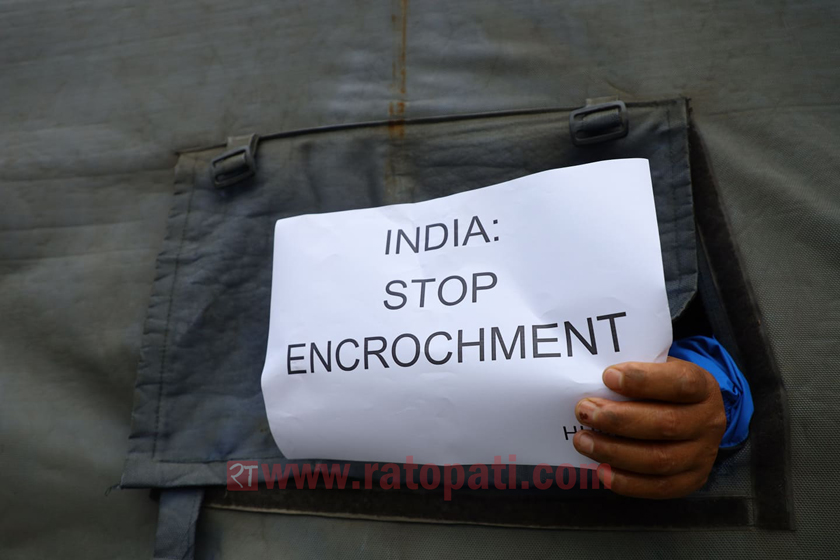
The people of Nepal have got a new map that covers all the territories of Nepal. The government of Nepal has already tabled the amendment bill in the parliament, to make necessary amendments in the constitution that are required as per the new map. It is a historical initiation for the protection of sovereignty and territorial integrity of Nepal and I would like to thank the government, opposition parties, and all those who contributed to this historical decision.
Now, the priority of the government should be to acquire its encroached territory. Prime Minister KP Sharma Oli has already committed to the parliament that he would leave no stone unturned to get its occupied territory. However, there is a need for strong support from all the political parties, thus, I earnestly appeal to all to form a national unity for the territorial integrity of Nepal.
Why did Nepal publish a new map with all its territories at the moment and not before? Why did not Nepal retaliate or raise voices then when the territory was being encroached? There may be genuine querries and concerns like these in our minds, in the minds of the people of Nepal. However, I would like to draw attention to three major points in this regard.
First, I would like to clarify that after the Sugauli Treaty, not any ruler or government of Nepal has signed any agreement between Nepal and India to handover any part of our land to India.
Second, there is greater consensus among all the political parties, social forces, civil societies, and people of Nepal that India has occupied our land and it should get its encroached territories, including Limpiyadhura, Lipulekh and Kalapani, and make the foreign security forces leave Nepal’s land. And this is the most important thing at present.
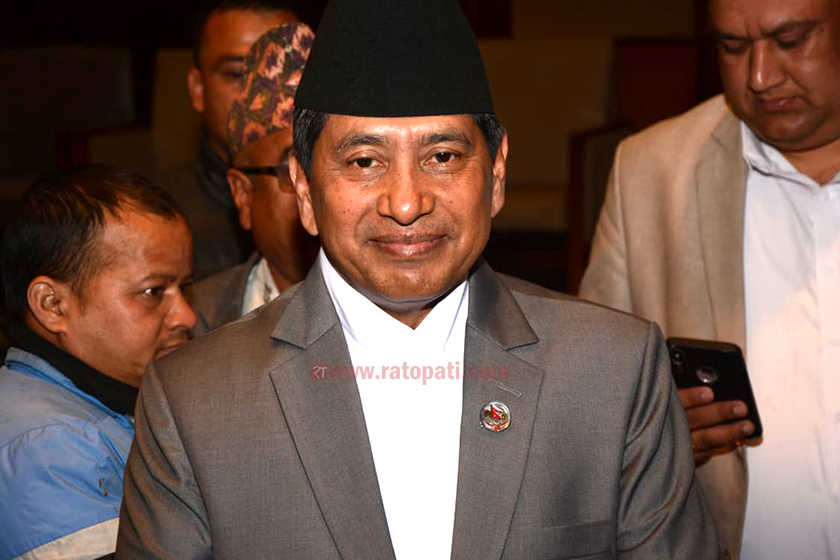
Third, there can be pain and grief among us, why the Nepalese territory was not included in the map of Nepal till date. Why objection was not made and step was not taken immediately. There might have been mistakes committed in the historical past. We can review our history and weaknesses if any, later in the proper time. However, at this moment, I would like to sincerely appeal to all the political parties, historians, civil society and intellectuals of Nepal that it is not the time for accusations and blame games, rather we should all get united and take this historical initiative to the logical conclusion.
Why did our neighbor encroach our land? When we raise voice against it, why are we rather accused? These kinds of things can make us agitated. However, we should understand that Diplomacy is the first line of defense in this 21st Century. Hence, we should resolve this issue through diplomatic dialogue and get our encroached land. Let us not get provoked or provoke anyone, rather maintain peace and get it resolved through political and diplomatic means.
For this, I would like to appeal to our neighbor India to immediately open the door for dialogue and resolve it through diplomatic means based on historical facts and shreds of evidence which will further strengthen the friendly relations between the two countries.
However, when our government and the political parties have proposed for dialogue through the diplomatic channels, the incumbent Indian Chief of Army Staff, former Indian Foreign Secretary and others have accused us, which is unfortunate and regretful.
I would like to remind you that when few countable nations around the world were not colonized, Nepal was one of them. While all the nations of South Asia were the colony of imperial powers, Nepal maintained its independence with dignity. No one needs to provoke such brave Nepalis to raise voices to protect their land. History has proved that Nepalese are capable to protect their sovereign territory. Therefore, I would like to request our neighbor to correct their statements, stop their baseless accusations as it will only create bitterness in the relations and hurdle in resolving the problems. Even if the concerned individuals did not willingly correct their statements, the government of India should correct it in their behavior and open door for dialogue.
The government and the people of both countries should understand that the relations between the two countries are not limited to neighborly diplomatic relations, there are multifaceted relations between us since historical times. Both the countries genuinely enjoy excellent social, cultural and people-to-people relations which is unique. We need to pay attention to how we can make these relations more cordial and stronger.
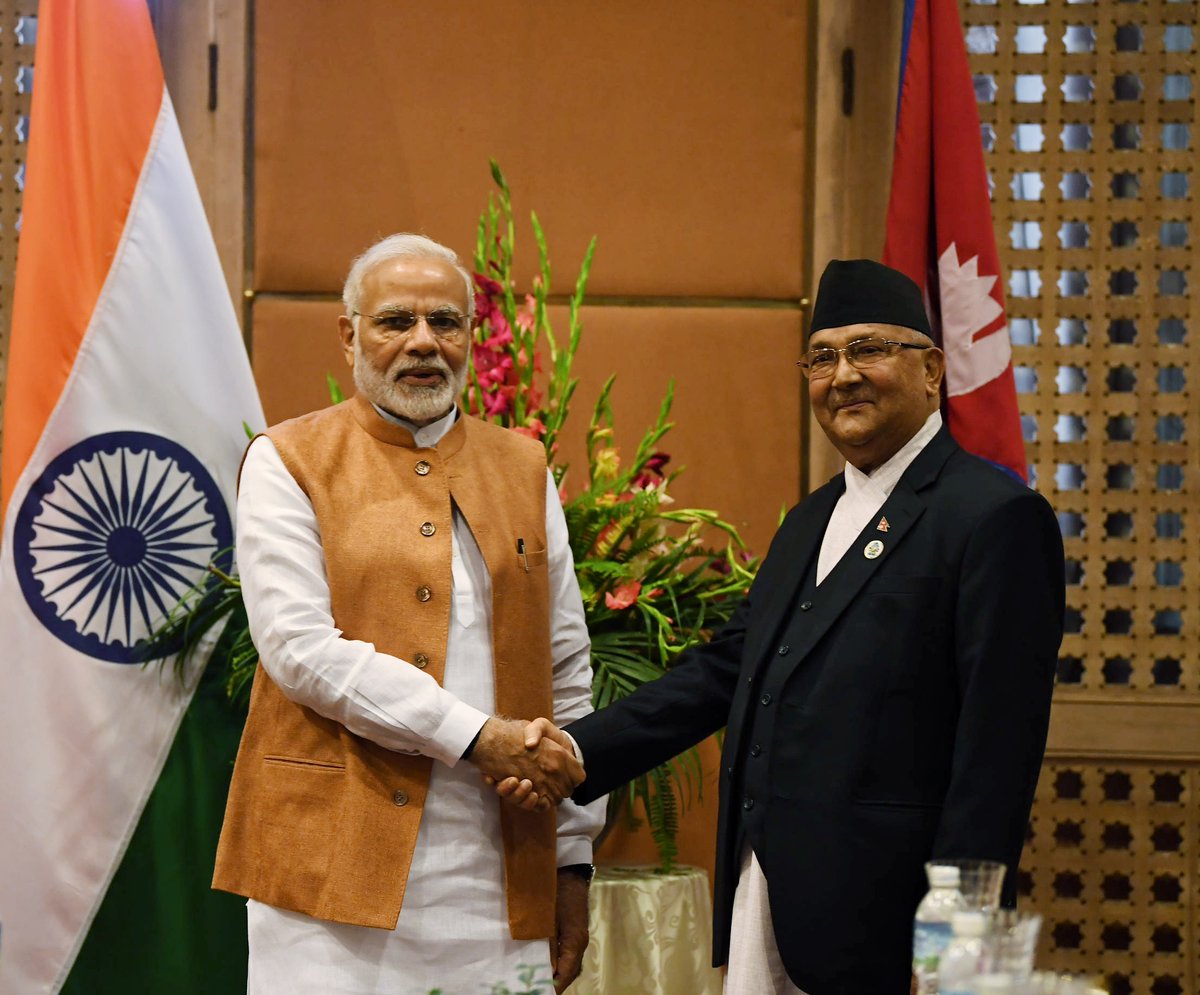
In this context, we would like to make clear that there can be no alternative to the friendly relations between India and Nepal. The only alternative is a better friendly relationship between the two countries. So both the countries should work for further deepening the cordial ties and Nepal is deeply committed to it.
None of the government, political parties, or the people of Nepal can go against India. We cannot even think of it.
However, every citizen of any country must protect its national sovereignty, territorial integrity, independence, national dignity and national interest, and Nepalese are no exception. Hence, I would like to draw the attention of Indian friends and policymakers that when Nepalese raise their voice for their national interest and fulfill their duty as good citizens, they should not view it as the voice against India. We are not against India but we have to speak for Nepal’s national sovereignty, territorial integrity, independence, national dignity and national interest.
We would also like to express that we do not want to have special political relations with any of our neighbors. Neither do we desire to be under anyone’s security umbrella. We do not want to play any ‘card’ against any neighbor. We want relations based on equi-proximity with all our neighbors. We have multi-dimensional relations with both our neighbors, we internalize and want to strengthen it.
I would also like to emphasize that if we can take forward our historical, cultural and social ties with India properly keeping pace with the present-day context, the relations between Nepal and India can be unique and exemplary. We are committed to such type of relations and we are open to it and ready to put all our efforts.
However, there are some problems in Nepal –India Relations. There are four aspects to it. First is Nepal –India Border Dispute. Nepalese territory is encroached by India at Limpiyadhura, Lipulekh, Kalipani and Susta. The border pillars are missing. Border encroachment is one of the major problems in Nepal-India relations. Hence, India should stop the encroachment and return the Nepalese territory to Nepal based on historical evidence. If it is done, one of the major problems between the two countries will be resolved.
The second problem is the unequal treaties between the two countries. There is the need to revisit and amend or revoke the unequal treaties of the past and install new treaties based on new realities of present times. The 1950 Indo-Nepal Treaty of Peace and Friendship is one of them, which should be replaced with a new treaty based on mutual respect and mutual benefit. Hence, we can take the relations in a positive direction by revoking all the unequal treaties of the past.
The third problem in Nepal-India relations is Indian interference in the internal affairs of Nepal. We do not want such activities in Nepal. After the promulgation of the new constitution in Nepal, we have been able to push back the Indian intervention and take the nation forward on our own independently. There is the need for self-criticism and course correction of such attitude and policies by the Indian establishment and Indian government. When Nepal promulgated a constitution drafted by their elected representations, which they had acquired after a long struggle of 60 years, the Indian government and people of India should have been delighted, instead, Nepal faced harsh blockade by India. If these kinds of activities are ended, the relations between the two will improve.
The fourth problem is that there are exploitation and discrimination even on economic aspects. For eg, the Koshi Agreement, Gandak agreement, Nepal’s struggle for transit rights, the imposition of blockade etc.
It is the need of the hour for both the countries to resolve these four major problems with a positive attitude, and reform as per the need of the hour, for strong and dynamic relations between the two neighboring countries, and it is possible.
Keeping these issues in mind, in 2016, the two countries formed the Eminent Persons’ Group (EPG) with experts from both the countries and were given five mandates.
To improvise and strengthen the relations between the two nations and elevate to the new height, three mandates were most important. The first and most important was to review the past treaties and agreements and give necessary recommendations to make it correspond to the 21st century.. Second was that the committee had to recommend the policies and measures that both the states had to adopt for deepening the economic, social, cultural and political ties based on new realities and build the mutual trust. The third was to provide the government with an institutional framework to improve the relations between the two countries for the new millennium. EGP came with a consensus report in consensus. As per the understanding, the Indian Prime Minister had to receive the report first followed by Nepal. However, to date, India has not received and endorsed it. It has made us concerned.
I strongly request the Indian Prime Minister to endorse it as soon as possible, and Nepal is willing to endorse it anytime. We are willing to discuss, debate and implement the recommendations of the EPG for the better relations of the two countries.
Hence, we should also be clear on what should be the road map for better Nepal-India Relations?
If we take forward the relations based on three fundamentals, our problems will be resolved immediately which will lead the relations to the new height and our relations will be turned exemplary. They are;
First, as per the principle of Sovereign Equality, both the countries should respect each other’s sovereignty, territorial integrity, independence and follow the principle of non-interference into each other’s internal affairs. If we follow this, it will create a strong base to take the relations forward.
Second, both countries should move forward with the concept of Mutual Benefit and Shared Prosperity where both countries can benefit from each other and grow together.
Third, without going against each other’s national sovereignty, independence, territorial integrity and national interest, we should be ready to address each other’s sensitivities and genuine concerns. From the Nepalese side, I would like to assure India that we are committed to addressing any of India’s sensitivities and genuine concern, provided it doesn't go against our national sovereignty, independence, territorial integrity, and national interest.
If we follow these three premises, we will have excellent relations between the two countries.
For all these, there is a need for dialogue and we have been appealing repeatedly to India for dialogue through the diplomatic channels, as soon as possible. It is our sincere appeal to the government of India to open the door for diplomatic dialogue.
It is welcoming that the Minister of External Affairs of India has shown consent for diplomatic dialogue. Even the Defense Minister of India Mr. Rajnath Singh has expressed that he is willing to have a dialogue with Nepal on the issue. Similarly, many political leaders, Indian intellectuals, and foreign policy experts have made a strong appeal to the Indian government to resolve the issue through dialogue. I would like to thank each one of our friends in India, however, it has to be implemented through action by the government.
Both sides have our stands, however, we are open to dialogue and resolve it based on historical evidence and facts. I reiterate that there is a need for diplomatic dialogue as soon as possible and resolve the problem once and for all.
I would also like to make a positive note on the aspect of the life (personality) of Indian Prime Minister Mr. Narendra Modi. Everyone knows that Mr. Modi is a spiritual figure. A spiritual figure like him knows it very well that Nepal is a secular country with religious freedom, tolerance, and harmony pursuing the value system of democracy like other countries. However, it is also a fact that the majority of the people of Nepal follow Hindu religion and culture by tradition. Nepal is a country carrying a unique Hindu identity. Hence, it is a Tapobhumi and Holyland for the people like Mr.Modi and Hindus of the world.
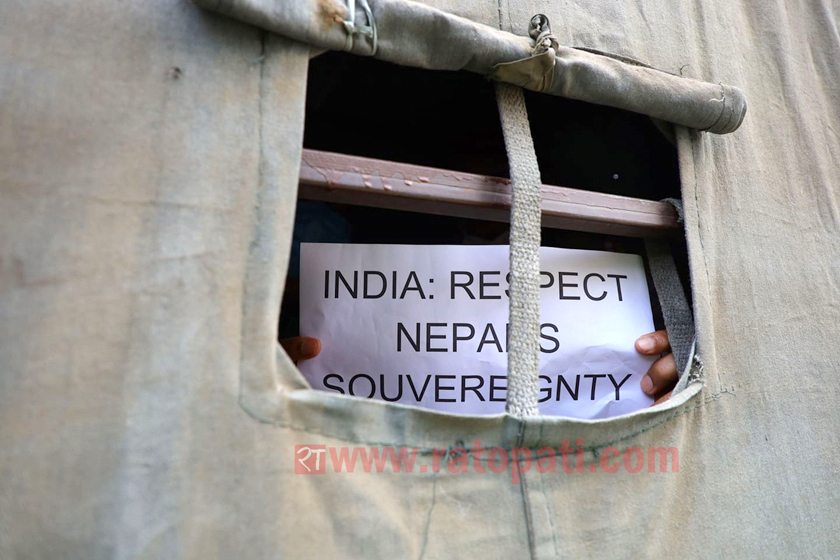
I would like to remind Mr. Modi about one incident from Mahabharat. In Mahabharat, when son Dhuryodhan goes to request his mother Ghandari to bless him for the victory in the war, before going to Krurkshetra, she refused to offer him with such blessing. But she gave him blessing – Win over yourself. She blessed him to win against false, high ambition and lies which is within him.
Today, in continuation of the Indian ruling establishment, the remnants of the past might be there, in you too. With your spiritual soul, you please worship and take the blessings and energy from Pasupatinath and Muktinath and commit to yourself that you should not take an inch of land from such a holy place. Commit to yourself that you will correct the past attitude of encroachment and occupation and stand by the side of Truth and strengthen Nepal-India friendship. If you thought that you will win over the trend prevailing still today as the remnants of the legacy of the past and move forward with the new vision, you will be greeted with big congratulation and thanks. This step will be proved to be a historical initiation to elevate Nepal-India relationship to a new height. I want to make a humble appeal to you not to miss this historical opportunity.
Thus, we can resolve all the issues through dialogue and no one should create any obstacles in this process. We are committed to it and we want to share the same with our friends from India.
We enjoy excellent relations with our northern neighbor China. We wish to further strengthen it. It also has unique features. Since China respects Nepal’s sovereignty, territorial integrity and does not interfere with Nepal’s affairs, the people of Nepal have high regard for China. Nepal does not have any outstanding problems with China. However, we would also like to request to China too, that, it should not be involved knowingly or unknowingly in any activities which may hurt Nepal’s sovereignty, independence, and territorial integrity or may result enthuse such activities.
I want to draw the attention to the agreement on Lipulek Pass to use it for the trade and cultural pilgrimage purpose, as mentioned in the joint statement of 2015 signed between India and China during Mr. Modi’s visit to China. We have already requested to review it. This agreement undermines Nepal’s sovereignty and territorial integrity and encourages encroaching tendency. It is to be understood clearly that even India has accepted this as a disputed land officially.
Even if Lipulek pass is to be used for trade and cultural purposes,it is not possible without Nepal’s participation, consent and trilateral agreement.
Hence, I appeal to China that it should go for a review, clarify its position and correct its mistake.
We want our excellent relations to be further strengthened.
Thus, Nepal exercises its independent Foreign policy where we give high priority to our neighbors. Similarly, we believe in strengthening strong ties with all the countries of the world. We also want to play a creative and constructive role at regional and multilateral forums. We appeal to all, as well, for this.
[English translation of Speech delivered by Narayankaji Shrestha in National Assembly, Nepal on 2nd June,2020.]

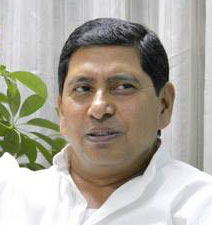
Leave Comment